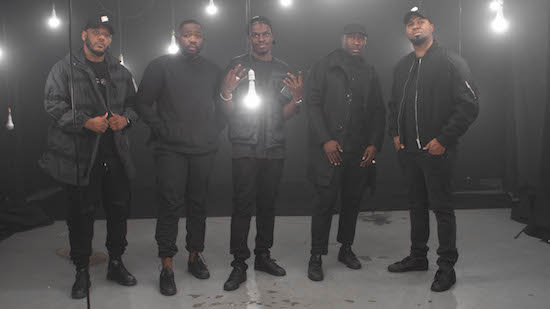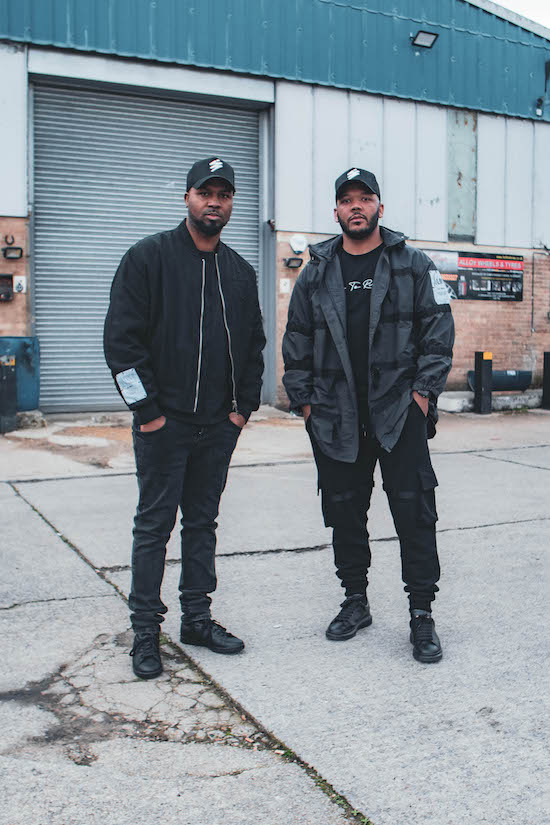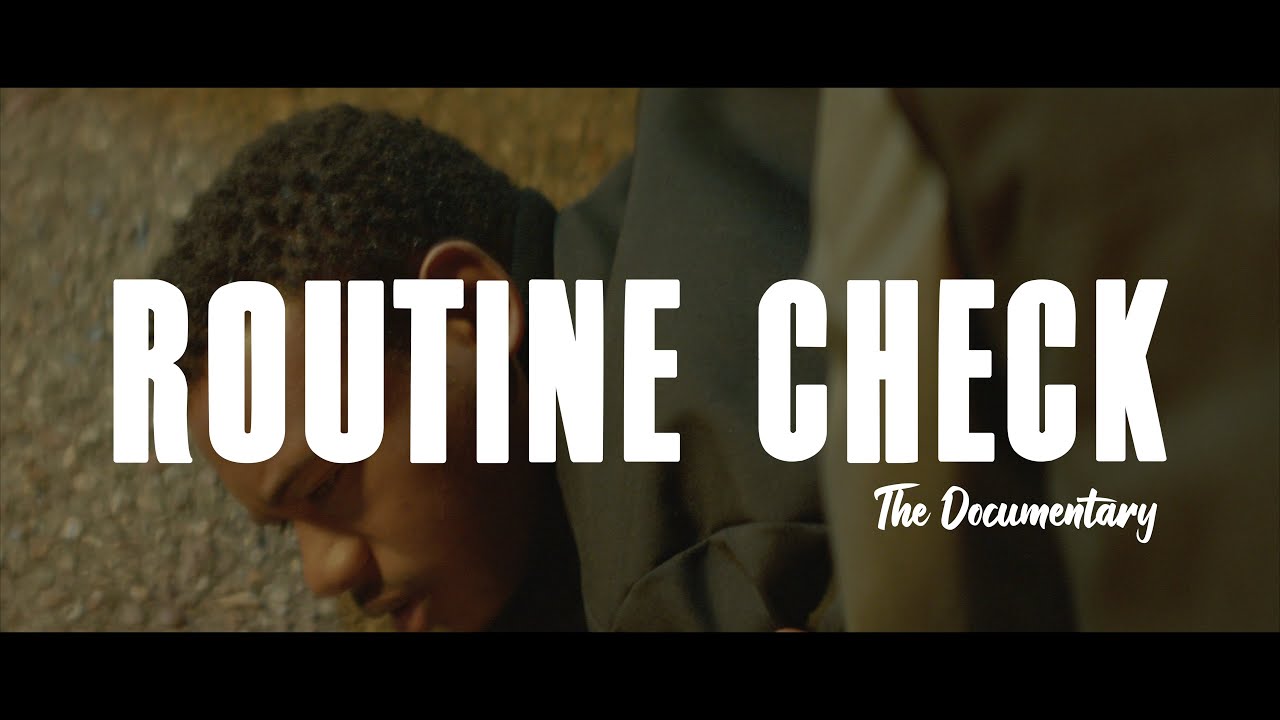All portraits by Sej Jheeta
Representing North London, iLL BLU are a production duo, consisting of James Grant and Darius Ellington-Forde, who initially bonded over their love for the infectious sound of UK funky, which was bubbling up and tearing down clubs in 2008.
Over the past decade, iLL BLU have been one of the few UK production teams to weather the storms of changing fashions however, moving seamlessly all the way up to UK drill. After making their name with UK funky anthems such as ‘Frontline’ by Princess Nyah and ‘Pull It’ with Shystie, in more recent years they have applied a rugged drill drum pattern to their foundational soulful palette, to create a gorgeous new concoction. Shining examples of this are ‘Magic’ featuring Bandokay & Double Lz, as well as ‘DUMPA’ featuring M24 & Unknown T; two of their smash hits from 2020, seeing them grab the hottest upcoming talent.
Their latest release, ‘Routine Check 2.0’ featuring The Mitchell Brothers and Sneakbo is another prime example of an ability to fuse the old and the new in a way that is both modern and whimsical. Transporting the more grimey ‘Routine Check’ – a version of the 2004 track by Kano & The Streets – via a generous garnish of UK drill seasoning and grabbing a vocal from one of the current scene’s most original voices, Sneakbo.
But they didn’t want to just limit themselves to production alone. Unable to ignore the current climate regarding police brutality, especially in America over the past year, the North London duo thought it would be great to shine a light on social injustice in the UK arising from stop and search measures, leading to the Routine Check documentary.
Produced by Ellington-Forde & Gary Graham, the film includes The Mitchell Brothers, Sneakbo and many other music industry figures giving interviews on their negative experiences with the police and you can watch it on YouTube below. Other members of the UK’s black music scene giving first person accounts of their experiences of police harassment, include singer Loick, Link Up TV executive Joey Clipstar and artist Predz UK.
When we look at the facts and figures, even the Government’s own official statistics show that if you are black you are ten times more likely to get stopped and searched than your white counterparts, hence, iLL BLU felt it was important to shine a light on the issue, so that the problem can be addressed.
This issue affects black people no matter their age, gender or class, with even the former Shadow Secretary Of State For Women And Equalities, Dawn Butler, stopped and searched last year, further showing that this is an institutional issue which needs to be explored and discussed. And Routine Check does exactly this.
Instead of lamenting over their negative experiences with the police, iLL BLU have chosen to take a commendably even-handed look at the situation, seeking solutions, attaining answers and to continuing to delve into the issue to raise awareness.
Where did the idea come from for the Routine Check documentary?
Darius Ellington-Forde: We were dropping ‘Routine Check 2.0’ and felt that it would be fitting to film a documentary piece around the release. The George Floyd situation happened, along with many others and we thought we should really try and document what is happening and bring awareness to what is going on out there, in regards to how the black youth and this culture are being targeted by the police.
Why was it important to you to document the stop and search topic in the way you choose?
DE: We thought it would be good coming from people within the music scene in a concentrated form, rather than just sporadic comments spread over social media. We thought let’s bring people together in the music industry who have shown awareness online and who have gone to venues to speak about the topic. As we had already made a song on the subject, it made sense to collect everyone in one place and have something for people to watch now, as well as later on.
What have your personal experiences of stop and search been like?
James Grant: For me, I was stopped and searched when I was about 18. I was just taking photographs around my area, and I saw three police officers walking down the road. As they got closer I thought to myself, because of my previous negative experiences with the police, let me not be close to them. When I started walking away from where I was, they immediately started running after me. Now, I didn’t run, because I hadn’t done anything wrong, but they caught up to me and they proceeded to ask me a load of questions, attempting to insinuate that I had stolen the camera I was using.
How did the incident make you feel?
JG: They made me feel like I was a criminal. As I got older I realised the stereotypical criteria they were using to stop black youth because of how they looked and dressed, but thank God I haven’t really been stopped and searched that many times in my adult life and that’s just because of the way I choose to move, but no one is exempt.
What do you think can be done to bridge the gap between the police and the black community?
DE: What we’re trying to let the police understand is; it’s not just one person, or two people… it’s a vast amount of people who all have the same negative experiences in terms of police interaction with the black community. There must be something wrong and these are people who are usually found to be innocent in the end. Why are you just choosing us? We need answers, we need to hold them up for accountability. Hopefully this documentary can give them the awareness to change their ways.
We could also do a part two of the documentary where we have the police’s side of the story and see where we can come to a happy medium.
Whilst you were working on the doc – what was one story that really stood out to you?
Darius: I think it was Predz who said that he lived in north west London and said it’s a fact that, if we have something nice, it feels like on the police’s end we’re not supposed to have it. His story was, as soon as he changed his car to a new state of the art model, he got stopped by the police and guns were put to his head. It’s not right, because if you’re black and driving a nice car, it seems like the automatic assumption is that you’re doing something illegal.

iLL BLU, the Mitchell Brothers and Sneakbo
What are your hopes for what comes out of the documentary?
JG: For me, it’s to continue the conversation. I think it can also be used as a tool for the police, to raise awareness and to educate. Additionally, It can be utilised by black children for them to see, unfortunately, this is what we’ve experienced, but they can learn from it, as they could be stopped in the future and they need to know how to conduct themselves when stopped. Additionally we want to raise awareness in the public, as just because police brutality has been a hot topic in the news cycle over the last year, doesn’t mean the problem has been solved, as black people we need to keep speaking until the issue is addressed.
How did you connect with the Mitchell Brothers and Sneakbo for ‘Routine Check 2.0’?
DE: It was by chance, meeting Tony from The Mitchell Brothers. We had a gig in Elephant & Castle and then we went to an after party, met him there and got talking. We kept in contact via a mutual friend of ours and started to brainstorm whether we should do a 2.0 of ‘Routine Check’, then the George Floyd situation happened and we thought let’s try to do something. Rather than us doing the online protesting, let’s do a record to shine a light on this social injustice. We also thought Sneakbo would be very fitting for the record, as he’s been targeted by the police for years.
Since you incorporate UK drill into your sound, how do you think it’s future fares?
JG: I think it’s just going to continue to grow. Obviously we know it didn’t start with us, it was originally a Chicago genre, but the UK adoption of it has definitely got it’s own sound now. We’ve seen it evolve over the last couple of years and I think the evolution will continue. You’ve got producers like ourselves who utilises various genres; then you’ve also got a lot of producers whose main focus is UK drill and they are very aware of how a scene can die if things don’t change: so you’ve got M1onthebeat; you’ve got BKay; you’ve got so many different producers who are pushing the sound forward and on top of this, you’ve got huge stars in the scene. Last year we had Headie One & Drake linking up and you also have stars from America who have embraced the sound like Pop Smoke (RIP) & Travis Scott. This shows that the sound is actually going global, with the likes of Australia and Ghana also popping up with their own UK drill scenes as well.
Who do you think is next up in the scene?
DE: You’ve got Central Cee; he’s definitely doing a lot at the moment, I feel like he’s got a bright future. Meekz Manny, Digga D, I’d say those are the main three, but Pa Salieu and BackRoad Gee are also doing their thing at the moment. It’s feeling like American hip hop in the 90s over here, we are having our golden age, it’s just a pity that we can’t do shows at the moment, because I think if we could, a lot of records would be going further.
Going back to your origins, you guys made the UK funky classic, ‘Say Yes’, this discussion has gone on for a while – but do you think funky could make a big come back?
DE: I’ve been keeping my eye on that scene and it’s not so much funky, but they’ve been borrowing from the Amapiano scene in South Africa. Before the lockdown, there were quite a lot of underground raves going on, there were loads of little festivals popping up as well and that’s how you build up a scene from the underground to reach the mainstream. If it wasn’t for the lockdown situation, we would have seen a lot more progress from the genre, as there was something seriously bubbling. There were even a few labels looking at a couple of the records, so I believe it has the potential to become popular music.
But in order for it to stay hitting the charts, is all down to the artists in the scene, because looking back on our own time in funky, once artists got a big record, they’d always switch up the genre rather than sticking it out with funky. But with this new crop, if they can maintain their sound, whilst still evolving with the time, then that’s the way I think this new type of funky will keep it’s longevity.
What can we expect from your debut project The BluPrint?
DE: It’s basically a blueprint of iLL BLU; we’ve come from doing raves, tearing down parties and making hits through the years, from funky to house to hip hop to drill and to Afro-swing. So this album is to showcase the different musical palettes we have at our disposal and we want to try to create that party atmosphere for the listener. We’ve got quite a few UK drill records on there, we’ve got an Afro-swing track on there, we’ve got a funky song on there and we’ve got a house single on there; so it’s going to be a mixed bunch to let the people know what they are dealing with and where we’ve come from.



